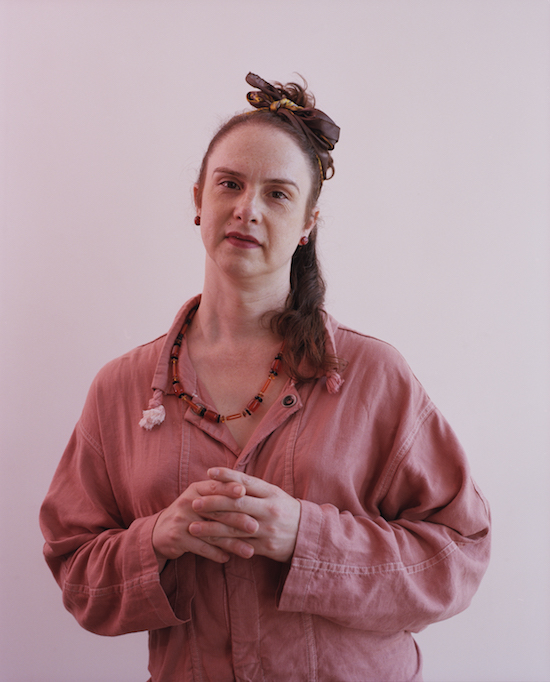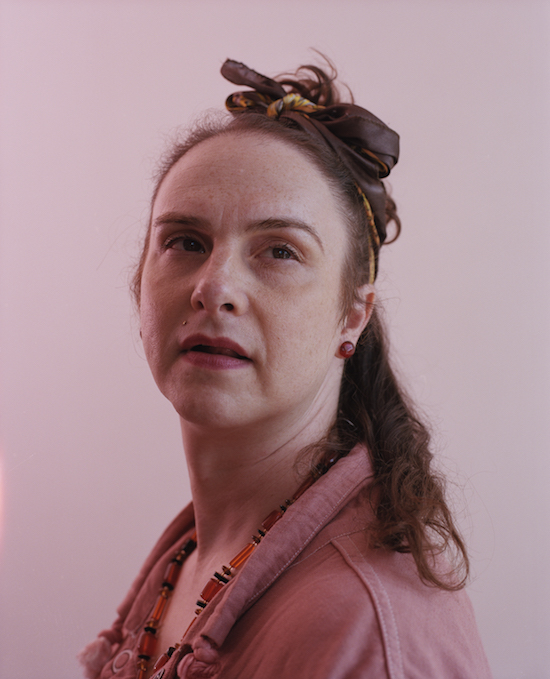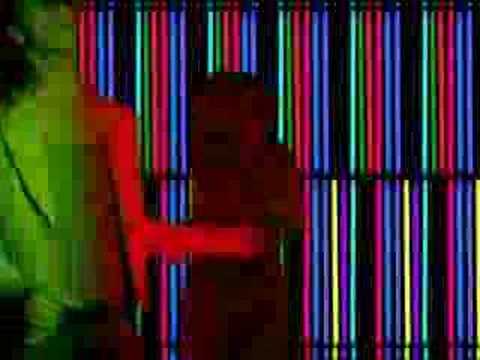Portraits by Guarionex Rodriguez Jr
It’s thirty years – almost to the day – since Gavilán Rayna Russom DJ’ed for the first time. She’s sat at her kitchen table, flapping a white lace fan in front of her face, laughing as she thinks back to it. We’re having our second Skype call during lockdown on what looks like a hot day in New York.
"My first paid DJing gig was the senior high school prom – I was a junior. I played acid house – I mean, it was 1990. I also played a lot of goth stuff for the arty kids, industrial music, a little bit of Jane’s Addiction. I played some stuff that you play, you know, and some stuff I wanted to play. I still do the same goddamn thing now! I drew from a really wide range of musics and tried to weave threads between them," she shrugs, inadvertently describing her own discography at the same time, which spans the fun and the strange with dark techno, weirdo disco and noise projects.
"I used to plan my sets. Now I never plan my sets. No way. Not even close. I’ve had the experience so many times where I come into the club to play after someone who’s had the whole room facing them, all ‘group mind’," she says, eyes widening into a fake hypnotised stupor. "Sometimes they’ll be playing stuff with this fascistic kick drum. Then I go into the booth and within five minutes, people start facing each other. People start fucking each other. Or the dance floor clears out completely. Or people are moving, exploring, having fun. I look out from the booth and I’m like, ‘Oh damn, shit got radicalised because of the way I play!’ I just show up, let go, play and interesting things can happen. Sure, sometimes it sucks. But I’d rather have it suck sometimes than go out and defrost some ready-made frozen dinner. I’m there in the room. Having a conversation with the room. Dance is absolutely part of that conversation."
A conversation with Rayna Russom is a warm, freewheeling pleasure. We talk about dancing, gender, joy, her horror of binaries, her love of trashy episodes of NCIS. She invites me to one of her online medium readings. She scathes eloquently about the deep problems of eurocentrism and white supremacy. (It’s two days after the murder of George Floyd.) Like her DJ sets and back catalogue of music, Russom’s thoughts usually link up and loop back on each other, leading us back onto certain themes, coming at them from a slightly different angle each time.
Fluidity is one of the recurring themes. Unearthing and innovating more relevant structures and systems is another. Dismantling capitalism keeps coming back too. She likes talking and enjoys the experience of being interviewed.
"It’s an opportunity to think about my work and carve out my identity. But it’s also the place I’ve been the most steamrollered," she admits.
Russom has made electronic and experimental music under various aliases since the late 1990s, including Paper Eyes, Black Meteoric Star, Gavom, Black Leotard Front, Knight Skyy, The Crystal Ark, and Gavin Russom (she laughs when she talks about this last ‘alias’, Gavin being the name she was given at birth, but dropped last year after coming out publicly as transgender in 2017).
Russom is a prolific composer, a talented builder of synths (nicknamed ‘The Wizard’ by many in the music community), and since this March, runner of her own DIY label, Voluminous Arts, which was set up "to support and disseminate works by boundary pushing artists."
Over the years she has made niche home tapes for audiences of 15 at a time, collaborated with legendary envelope pusher Cosey Fanni Tutti, experimental trombonist Peter Zummo and Chicago rapper KC Ortiz, played in psychedelic noise bands with Lightning Bolt’s Brian Chippendale, gatecrashed divey performance art venues in black bodysocks with Miami artist Delia Gonzalez and headlined Coachella as a member of LCD Soundsystem.
She’s put out three excellent new solo albums in the past six months alone. The Envoy is a gorgeous record exploring gender and taking inspiration from Ursula K. Le Guin’s 1960s novel The Left Hand Of Darkness. Secret Passage is Russom’s homage to the East Side Rail Tunnel in Providence, Rhode Island where she grew up and the friendships she made there, while Disco, under her Black Meteoric Star alias, is a shimmering mix of spoken word and pounding electronic workouts that wants to resist the tight genre compartments that artists normally get shoehorned into. For Russom, there is no binary between thinking music and dancing music, the corporeal or the intellectual, the ‘clever’ and the joyous, so her work plays on those continuums all the time.
She’s very good at a lot of genres, a polyvocal, trans-disciplined artist bubbling with ideas and capable of casting a fast spell on a dancefloor, yet seems to lack the wider recognition she should have. As she points out, she’s not someone who’s ever been asked to play, for example, Panorama Bar, or Griessmühle, or Dekmantel festival.
"I’ve never been offered them," she states with a quick lift of her shoulders. "It’s so obvious I should be playing there," she adds with a quiet laugh. "I’m not particularly bitter but it’s kind of a conundrum. Exclusion has been a big part of my experience. It’s partly down to transmisogyny. I had a residency at Bossa Nova Civic Club in New York for four years which was a really special thing. I’ve had many amazing experiences. But you know, for whatever reason, I’ve not had certain opportunities. It’s a broken fucking system. That’s why I started my own label. I want to be abundantly fucking clear about what I’m doing. I get to tell my story and let others tell theirs. And build community."
The LCD thing is still a touchy subject, as she explains, but one that she’s more or less found her peace with.
"James [Murphy] has always been kind and generous to me. My personal relationship with him has been wonderful and I’d probably have starved to death on the street if he hadn’t asked me to be in his band," she explains, talking about joining the electro-disco act to play synths and percussion around the time she moved back to New York after living in Berlin for several years. She’d previously released several stunning dance floor records on Murphy’s DFA label – including the addictive polylingual banger ‘ Casual Friday’ as Black Leotard Front and the 2007 EP The Days Of Mars with Delia Gonzalez, which included the dark, exhilarating grooves of ‘Relevée’, remixed later by Carl Craig.
"One of the things that has been problematic about most of my engagements with the press and the internet, and the world, is that somebody else has told the story, in ways that have been very specifically negating to what the story actually is." She’s not being critical of DFA or LCD, she’s quick to point out. It’s more of a structural problem, she says.
"My association with them was always going to negate me. So I had to leave DFA, legally and formally in 2014. I like those people and I’m friendly with those people. But those entities and those worlds are spearheaded by straight white men. They take up so much space and have such mass appeal. My affiliation with them meant people always saw that and not what I was doing.
"LCD was beneficial for me, sure; I went from playing shows for a handful of people in punk venues to a whole different scope and reach. But in the long term, I just got blasted out of context. I’d get booked for shows and people would have no idea what I do, or my discography. Bookers would ask me not to play the music I was playing. Over and over again. That was a decade of my life. People booked me because they couldn’t afford James. It’s so depressing. But there’s a limit to the value of pulling it apart and analysing it now."
Voluminous Arts, was due to launch in March, just as the COVID-19 pandemic broke, so she took things online instead. A few hours after we chat, there she is, throwing a launch party with guest acts on Instagram TV, dressed in a full-length neon pink fishnet stocking and skull mask, reading lines from No More White Presidents, an experimental film that she directed and soundtracked, under her Black Meteoric Star alias.
"I’m so excited. I get to help a younger generation of artists have a different experience. But [because of coronavirus] no one knows what is going to happen to nightlife now. I love the word nightlife – it’s so beautiful and evocative. It makes it sound like it’s all light and fun, but it is deadly serious. It’s a critical form of survival for humanity that has not always been given space in our culture. In this new landscape, what are these new structures going to be that are safe and sustainable and meaningful? How can we complicate the scene or trouble the genres? Sharing music in physical space is so important to me, where dance is the suggested mode of engaging in it."
One of her earliest memories is listening to Scottish bagpipe music and spinning around to the drones, while staring at a Persian rug. She was either four or five at the time and remembers it as an early psychedelic experience. "Dancing was always affirmed as an important thing to do. My dad was from Detroit and listened to a lot of black R&B, Motown and jazz. Music has always been very healing for me – making it, sharing it, dancing to it."
Somewhere in the middle of a long and enjoyable meander around what is psychedelic and ecstatic, we end up discussing that familiar notion that dancing helps people to get release from conformity.
It’s not that simple though, as far as Russom is concerned, and to demonstrate, she begins dissecting the "nightmare models of medieval Europe," where people lived under deeply oppressive, top-down feudal structures with heavy restrictions, but occasionally got to go bananas during feasts or festivals. Not really that different from a modern day binge at Burning Man or a four-day bender in clubland then, she muses.
"Carnival quarrels with Lent. It’s one of the problems of whiteness. Over the generations of our current colonial nightmare, there’s this real separation between body and mind. This idea that these two things are against each other. The mind is there to regiment things, the body is always rebelling. I think it’s why a lot of white folks don’t want to be in their bodies. When a black man gets shot in Minneapolis, there’s a complicity in the white body."

For Russom, dismantling binaries goes hand in hand with building new social frameworks. In terms of nightlife or music festivals, and particularly in queer culture, she’s uncomfortable with the idea of spaces that allow people to come in, let it all hang out, then go straight back to normal afterwards.
"That temporary relief can happen in clubs. But individual identities also need to exist outside them. In a way that fundamentally changes the way you are in the world. Or else we find problems of invisibility and exclusion. And physical violence."
Through a conversation about dance and hedonism, we’ve returned to her love of fluidity and boundaryless forms, and these notions can obviously be applied to the gender spectrum too.
"Before my transition, there was this shadowy mask that people projected things onto. My male presenting identity, to which I never felt an authentic connection. I just could not be those projections."
One of the reasons Russom began taking hormones during her medical transition – she’d felt she was female since she was a small child and when she was a bit older, used to take her girlfriend’s birth control pills – was to alter her brain’s chemistry and reduce what she considered to be toxic levels of testosterone in her body.
"It was impeding the way I thought and communicated. It’s a straight up biochemical thing. Before I started to take hormones I experienced a real over-compartmentalisation in my mind that was sometimes painful. It was just a thing that happened in my brain – this bashing together of ideas and a need to categorise them. And a need to use all the aliases, right? To create multiplicities of sound. The hormones absolutely changed my brain, 1000 percent."
Those same changes are interlinked with the way she makes music too.
"As a composer, modelling polyvocality through my work has always been important. Not something I wanted to flatten out. Within the tracks there are elements doing things and multiple stories being told. The hi-hat is telling a different story from the bass and the kick drum, they are having a conversation."
We get on to talking about the exclusive interview that Wendy Carlos gave Playboy in 1979. The pioneering composer of Switched-On Bach and the A Clockwork Orange soundtrack, and one of the early proponents of the Moog synthesiser (who is coincidentally also from Rhode Island), chose the title as the publication most likely to sensitively handle the then barely-talked-about issues of gender reassignment surgery and being transgender.
“I also did a Playboy interview around 2017 – just a small thing online with a trans activist friend of mine – and the day I did that my mum sent me that Wendy Carlos interview. As a public figure going through a transition, I needed to sit down with a journalist and say what was going on. If I didn’t do that, someone else was going to tell the story and certainly in the ’70s, even more so. So I’m reading the interview and on a musical level, hey, not all trans women who make electronic music with synthesisers think the same way! Wow, she was so conservative! She’s such a classical musician. Her thought process about composition is the exact thing I’m rebelling against with every cell of my body… They’re talking about disco and Wendy Carlos says, ‘I can’t bear anything that repeats the same thing for more than 16 bars’. Wendy Carlos would hate my music!"
“On Disco, Black Meteoric Star’s vision has been allowed to expand into an almost mythologically epic space," reads the album press release, which Russom wrote. "Settle in and absorb the frequencies. As the closing track suggests, the virtual disco these sounds evoke is for ‘Freaks Only’."
The track she describes is a highly danceable, outsider-embracing banger, just another example of her many styles and beliefs converging for a track that makes you want to move.
“My music speaks to the body because it comes from the body! You can enjoy things on different levels and hopefully find things thought provoking while your body is drawn to it too.”



